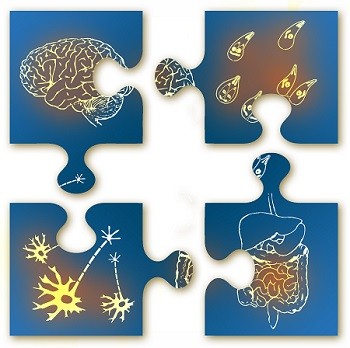The microbiota–gut–brain axis
Gut microbiota changes in children with autism spectrum disorder: a systematic review
As more animal studies start to disentangle pathways linking the gut microbial ecosystem and neurobehavioral traits, human studies have grown rapidly. Many have since investigated the bidirectional communicati...Gut Pathogens 2020 12:6Synergistic effects of APOE and sex on the gut microbiome of young EFAD transgenic mice
Alzheimer’s disease (AD) is a fatal neurodegenerative disease. APOE4 is the greatest genetic risk factor for AD, increasing risk up to 15-fold compared to the common APOE3. Importantly, female (♀) APOE4 carriers ...Molecular Neurodegeneration 2019 14:47Gut microbiota from NLRP3-deficient mice ameliorates depressive-like behaviors by regulating astrocyte dysfunction via circHIPK2
Inflammasomes have been found to interact with the gut microbiota, and this effect is associated with depression, but the mechanisms underlying this interaction have not been elucidated in detail.Microbiome 2019 7:116Antibiotics, gut microbiota, and Alzheimer’s disease
Alzheimer’s disease (AD) is a neurodegenerative disease whose various pathophysiological aspects are still being investigated. Recently, it has been hypothesized that AD may be associated with a dysbiosis of m...Journal of Neuroinflammation 2019 16:108Evidence for an association of gut microbial Clostridia with brain functional connectivity and gastrointestinal sensorimotor function in patients with irritable bowel syndrome, based on tripartite network analysis
Evidence from preclinical and clinical studies suggests that interactions among the brain, gut, and microbiota may affect the pathophysiology of irritable bowel syndrome (IBS). As disruptions in central and pe...Microbiome 2019 7:45Impact of microbiota on central nervous system and neurological diseases: the gut-brain axis
Development of central nervous system (CNS) is regulated by both intrinsic and peripheral signals. Previous studies have suggested that environmental factors affect neurological activities under both physiolog...Journal of Neuroinflammation 2019 16:53The gut microbiota-derived metabolite trimethylamine N-oxide is elevated in Alzheimer’s disease
Trimethylamine N-oxide (TMAO), a small molecule produced by the metaorganismal metabolism of dietary choline, has been implicated in human disease pathogenesis, including known risk factors for Alzheimer’s diseas...Alzheimer's Research & Therapy 2018 10:124Antibiotic resistance, the 3As and the road ahead
Antibiotic resistance is by far one of the most important health threats of our time. Only a global concerted effort of several disciplines based on the One-Health concept will help in slowing down this proces...Gut Pathogens 2018 10:52Bidirectional gut-brain-microbiota axis as a potential link between inflammatory bowel disease and ischemic stroke
Emerging evidence suggests that gut-brain-microbiota axis (GBMAx) may play a pivotal role linking gastrointestinal and neuronal disease. In this review, we summarize the latest advances in studies of GBMAx in ...Journal of Neuroinflammation 2018 15:339The valproic acid rat model of autism presents with gut bacterial dysbiosis similar to that in human autism
Gut microbiota has the capacity to impact the regular function of the brain, which can in turn affect the composition of microbiota. Autism spectrum disorder (ASD) patients suffer from gastrointestinal problem...Molecular Autism 2018 9:61
 Our understanding of the complex and bidirectional signalling relationship between the gastrointestinal tract and the brain is evolving quickly. This relationship, dubbed the microbiota-gut-brain axis, is thought to be involved in many aspects of homeostasis in addition to the pathogenesis of several diseases, ranging from neurological and degenerative conditions to autoimmune diseases.
Our understanding of the complex and bidirectional signalling relationship between the gastrointestinal tract and the brain is evolving quickly. This relationship, dubbed the microbiota-gut-brain axis, is thought to be involved in many aspects of homeostasis in addition to the pathogenesis of several diseases, ranging from neurological and degenerative conditions to autoimmune diseases. 




















.jpg)










No hay comentarios:
Publicar un comentario